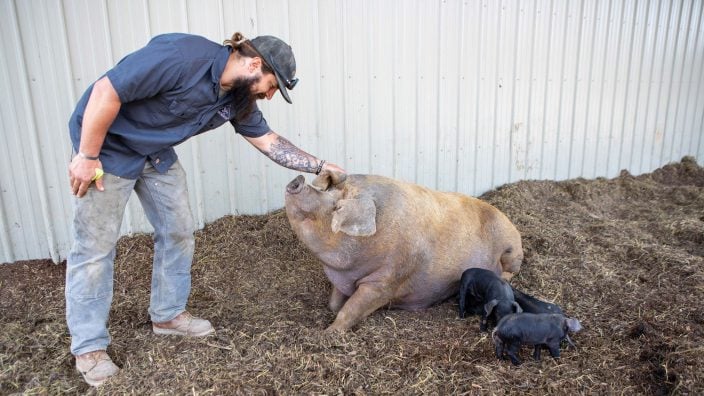Farmer’s Guide to Trucking Regulations available to Ohio Farm Bureau members
The guide includes a farm driver checklist, overview of state and federal regulations and exemptions, CDL qualifications and more.
Read More
Matt Schaar left for the U.S. Army two weeks after graduating from high school in 2004 to “get money for college, serve my country, do my part and grow up a little bit.”
Schaar, who served with the 82nd Airborne Infantry Division, was fresh out of basic training when he was sent overseas the first time. He ended up serving three tours each in Iraq and Afghanistan, as well as three more tours in other destinations around the world.
He also learned about farming while serving thousands of miles from home.
“I was in the mountains in Afghanistan or the middle-of-nowhere Iraq, and there was always a cow or chickens everywhere,” he said. “This is how people get their food and it was the best food I’d ever eaten. I’ve been in the best restaurants in the world and the best chicken I ever had was on a dirt floor in Afghanistan.”
Schaar, who retired from the army as a Special Forces Green Beret after being injured in Somalia in 2016, had a vision he shared with friend, Joey Ellwood. They teamed up to bring their farm vision to life in Tuscarawas County. Schaar now raises direct-to-consumer pigs, chickens, turkeys and some beef cattle as well as honeybees, with his wife, Charlotte, and young children at EDS Ranch in Gnadenhutten. Charlotte is an ROTC instructor at Kent State and is still in the active reserves as a supply chain logistics specialist. They are Farm Bureau members in Tuscarawas County.
They are just the kind of service members the Farmer Veteran Coalition not only help get started, but also thrive in the farming industry. FVC was founded by CEO Michael O’Gorman in 2008 with a handful of veterans looking to begin their farming careers. Gorman noted in an Our Ohio Weekly podcast that agriculture needs more farmers, and veterans are a natural fit.
“We can help the veterans as they come home, and we can help the agricultural community as well,” O’Gorman said.
 Today, there are 20,000 FVC members, robust mentoring and grants programs, a well-established farmer-to-farmer network and a Homegrown by Heroes label that lets consumers know the people growing their food and fiber are military veterans.
Today, there are 20,000 FVC members, robust mentoring and grants programs, a well-established farmer-to-farmer network and a Homegrown by Heroes label that lets consumers know the people growing their food and fiber are military veterans.
When the pandemic hit, EDS Ranch was just starting to grow its customer base. The demand for local food, fueled in part by the run on traditional grocery stores, saw that customer base literally grow overnight, Schaar said.
When they were making deliveries during the day — working with other small farmers to make sure supply could keep pace with demand — Schaar was doing farm chores in the middle of the night. He credits the FVC with helping establish that small farms network EDS Ranch worked with at the height of the pandemic
“I told Joey ‘If you ever want to know what it is like to serve in the military, this is it.’ It felt like an army operation and I felt like I was back in the military.”
His service training perfectly prepared him for a career in agriculture, he said.
“You are faced with a lot of obstacles to overcome and you learn fieldcraft in the military,” he said, noting that his ability to fix an issue such as broken down machinery has saved the farm “thousands and thousands of dollars.”
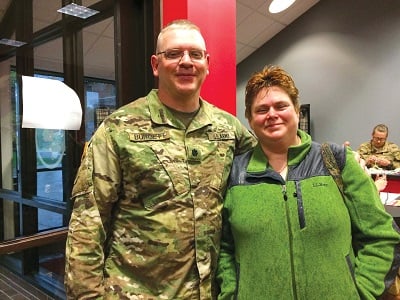
Thirty-year National Guardsman Mike Burgett and his wife, Cindy, have a free-range chicken, turkey, freezer beef and horse-quality hay operation in Geneva. The Ashtabula County Farm Bureau members also have a small private horse boarding and training farm with focus on dressage and hunter jumpers.
Cindy is working the day-to-day operations of Contraban Farms while Mike is on active duty at U.S. Army War College. He’s in a 10-month resident course for senior officers to prepare for strategic national-level leadership positions.
“I’ve been working on the farm full time,” Cindy said. “Feed, clean, rinse and repeat. There isn’t a whole lot of spare time, but it is rewarding. If it was up to me, I’d never leave the farm.”
Mike grew up on a 150-year-old dairy farm and Cindy raised horses. They knew what it took to run a farm, but they give credit to FVC for helping along the way, including a $3,000 grant to establish freezer beef a few years back.
“In 2019, I was awarded a scholarship to attend the Farmer Veteran Coalition national conference in Austin, Texas,” Mike said. “It was a great opportunity to spend time with fellow farmer veterans and attend seminars from successful farmers, FVC leadership and government agencies. I have established long-term relationships with some of the farmers I met there and have assisted one on putting together his business plan and preparation for his submission for this year’s fellowship. The great thing about FVC is the members have farms of every size with a wide variety of farm types.”
The chickens literally rule the roost on Noni’s Farms in Wheelersburg, owned by Beth Ann Earl.
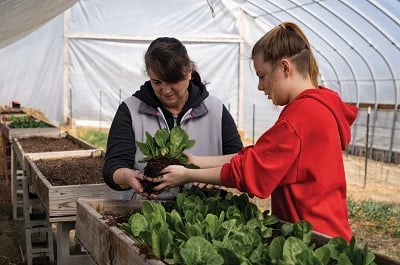
The 22-year Navy veteran didn’t decide she wanted to go into agriculture when she retired from the military, but she did want something.
“I always moved so much that I never had a great garden,” she said. “I really wanted to have a great garden.”
She and her husband, Scott, a retired firefighter, started to grow their own produce in Huntington, W. Va. Soon, they were selling produce at a farmers market. Then they expanded into unique pastured layers who produce their own Easter-colored eggs.
Eventually they moved to Scioto County and added sheep, lamb and an unnamed donkey named Jack (it’s a long story) to the menagerie. Earl is now a Scioto County Farm Bureau board member.
“When we moved (to Ohio) I was eager to get involved,” she said. She attended a “phenomenal” Conservation School event in the county and was hooked. Farm Bureau, FVC and others have been instrumental in helping Earl and her family flourish on their hillside farm. A grant from the coalition paid for her first high tunnel, and a grant from USDA’s Natural Resources Conservation Service paid for another, where she experiments with growing greens all year long. Noni’s Farm now sells direct-to-consumer and at two different farmers markets in Huntington and Portsmouth.
“Veterans have a really great, transferable skill set for farming. For those who have come home with PTSD or maybe a physical issue, farming can be therapeutic, too,” she said. “I was a city girl. I totally didn’t see this coming, but I love it. I love the lifestyle and I love the value of being at this place where you can exist, your self-worth has value and you serve a purpose.”
Photos by Dave Gore and Bryan Rinnert
Photo caption: Military veteran Matt Schaar co-owns EDS Ranch in Tuscarawas County.


The guide includes a farm driver checklist, overview of state and federal regulations and exemptions, CDL qualifications and more.
Read More


Ohio Farm Bureau provides opportunities, platforms and resources to help you develop your voice in the industry and give farmers a seat at the table with leaders and legislators.
Read More

The emergency fuel waiver to allow the sale of summer gasoline blends containing 15% ethanol will lengthen the period during which Americans can continue buying E15 from June 1 to Sept. 15.
Read More

The Small-Scale Food Business Guide covers federal and state regulations for selling food products such as raw meat, dairy, eggs, baked goods, cottage foods, fruits and vegetables, honey and more.
Read More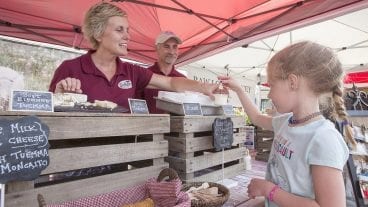
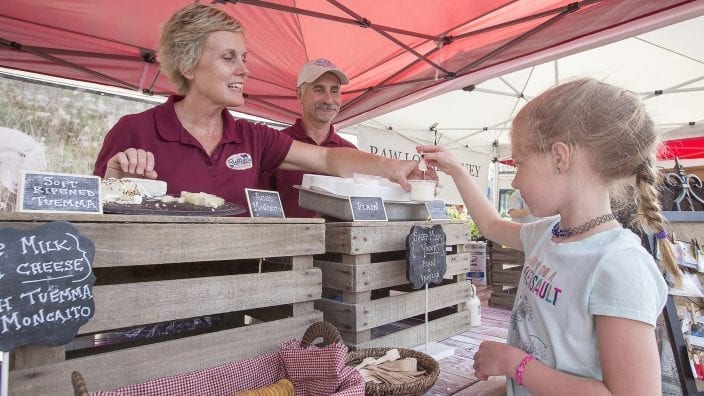
New resources and technology are broadening the different types of sales tools and strategies available to farmers.
Read More

ODA will enroll 500,000 acres into the program for a two-week sign-up period, beginning April 22, 2024, through May 6, 2024. Contact local SWCD offices to apply.
Read More

Katie Share of Columbus has been named ExploreAg and Youth Development Specialist for Ohio Farm Bureau.
Read More

Mary Klopfenstein of Delphos has been named Young Ag Professional and Ag Literacy Program Specialist for Ohio Farm Bureau.
Read More

The plan has been updated to give sole proprietors access to more rate stability and a smart solution that offers potential savings on health care.
Read More

The American Farm Bureau Federation, in partnership with Farm Credit, is seeking entrepreneurs to apply online by June 15 for the 2025 Farm Bureau Ag Innovation Challenge.
Read More